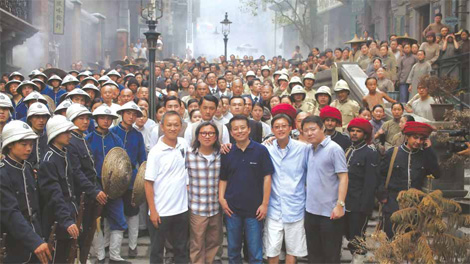Teddy Chan's titanic struggle
|
|
|
From left to right, Teddy Chan, Peter Chan, Huang Jianxin, Lau Wai-keung and Yu Dong with their new movie "Bodyguards and Assassins"' cast on the set. [China Daily] |
Hong Kong director Teddy Chan set out to make a film costing HK$68 million (US$8.8 million) in 1999 and insisted one third of the money be used to create a set replicating old Hong Kong.
He had no idea the film would take him 10 years to complete.
"Bodyguards and Assassins" centers on eight Hong Kong heroes, including a beggar, a gambler and a vendor. They protected Dr. Sun Yat-sen from an assassination attempt in 1906, when he was leading the movement to overthrow the Qing Dynasty (1644-1911).
What Chan has experienced over the past decade is a tale no less dramatic than the film's storyline. He was struck by depression, the death of a family member and frequent frustrations in building the set. Even so, with the help of many others, he eventually completed the movie.
"The shooting of the film was what it was all about - many anonymous heroes working for the same goal," he says.
Three Hong Kong directors co-directed the film with Chan. Each of them led a team to ensure the film was shown on December 18, which producer Peter Chan had named long before as the release date.
One week before Christmas and two weeks before the New Year is believed to be the optimum time to screen a movie in China. But Shanghai's spring rains delayed filming for a month. Additionally, the movie gathers more than 10 A-list actors from the mainland and Hong Kong, all of whom had full schedules.
A desperate Teddy Chan called his friends to help out.
Lau Wai-keung, director of the smash hit "Infernal Affairs," arrived in Shanghai the day after being called and immediately started directing a team. Producer Peter Chan and action designer Tung Wei directed the two other teams.
Yu Dong, head of Polybona Film Distribution Company and one of the film's investors, wanted to credit Lau and the other co-directors as co-producers, but they refused, saying they just wanted to help out.
"It's like the film is more than just a film, but something about Hong Kong filmmakers' self-esteem," Yu says. "It has become an event in the Hong Kong film industry. Everybody knows how hard (Teddy) Chan has worked to pursue this dream. So when we discovered it was once again being held up it was almost like an obligation to help out."
When he first raised the idea 10 years ago, many thought Teddy Chan was crazy. The sum of US$8.8 million was twice the revenue of the highest-grossing film that year in Hong Kong.
The Hong Kong film industry was in severe decline in the late 1990s, confronted by piracy and the financial crisis in Southeast Asia. Only 85 films were produced in the city in 1998. Formerly it was used to churning out 300 flicks a year.
He showed the script to many film financiers, most of whom liked it but all of them raised the same question: Could you give up building the set?
His intention to build a replica of downtown Hong Kong in 1906 was expected to take up at least one third of the budget.
"It is a Hong Kong story," he says. "But it's impractical to shoot today's Hong Kong for a film set in 1906. The metro stations and skyscrapers are everywhere."
Eventually Hong Kong banker Ronald Tsang agreed to cover the budget.
At the end of 2002, construction of the set started in Foshan, a city in Guangdong province. Then, SARS hit and construction was halted. The set was not completed until January 2004. There were buildings, streets, stores and even a harbor. Teddy Chan felt he was close to achieving his dream.
But just one month later he was stunned by news that Tsang had committed suicide on his yacht, after being defrauded of tens of millions dollars.
When Teddy Chan returned to Hong Kong to deal with the banks that he suspected had embezzled Tsang's money, he learned his mother, in Australia, had suffered a stroke. Then, his sister was diagnosed with cancer. Finally, he was involved in a car accident and his mother died.
Filming stopped.
He left Hong Kong and studied Buddhism in Canada and India to pull himself together. His friend, the producer Peter Chan, was exploring the mainland market. His romantic musical, "Perhaps Love" and war epic "The Warlords" were smash hits. He also befriended producers Huang Jianxin and Yu Dong.
In February this year, the three declared they would join forces to set up a production company named Cinema Popular. The first project was Teddy Chan's unfinished film.
In October 2008, construction on his dream set began at the Shanghai Shengqiang film base. The film's budget rose to US$23 million, and the set's size increased twofold.
The original cast and crew returned to help, such as costume designer Dora Ng, the action designer Tung Wei, and production designer Kenneth Mak.
The film gathers a constellation of stars, such as Donnie Yen, Jacky Cheung, Leon Lai, Nicholas Tse and Eric Tsang. In addition to the original all-Hong Kong cast, mainland actor Wang Xueqi, actresses Fan Bingbing, Zhou Yun and singer Chris Lee also joined in.
At a pre-screening for a selected audience on December 6, 12 days before its premiere, Teddy Chan anonymously sat among the audience, watching their reactions. They cried during the movie and burst into long applause when it ended.
"When I left the theater I was relaxed," he says. "I have no regrets now."
 0 Comments
0 Comments








Comments